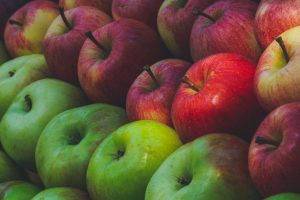
Apples are a popular fruit that are grown in different places around the world. Come autumn, apples can be seen filling farm stands and supermarkets all over North America. Apples are available year-round, but many apple lovers insist there’s nothing better than plucking an apple directly off the tree in the fall. Apple orchards and pick-your-own farms are visited each autumn by apple lovers anxious for apples’ tart and juicy taste. Many people pick more apples than they can eat in a few days, so it pays to learn how to store apples properly so none of them go to waste.

Start by picking a variety of apple that won’t go bad too quickly. Apple growers can make suggestions, but Jonathan, Rome, Fuji, and Granny Smith varieties tend to last longer than other varieties. Choose apples that are free of blemishes or soft spots. The adage that “one bad apple can spoil the whole bunch” bears some truth. Apples give off ethylene gas as they decay, and a rotting apple can quickly affect nearby apples.
A good place to store apples in the short-term is in the refrigerator where it is cool. Put the apples in the crisper drawer. Do not store them with vegetables, as the apples may cause the veggies to ripen or rot prematurely. If you plan on long-term storage, a few extra steps are necessary. Apples need to be individually wrapped so they will not come in contact with other apples. Newsprint works great; just be sure to pick the pages that are done in black ink because colored ink may contain heavy metals. Once wrapped, place each apple in a container padded with more newspaper. Store this container in a cool place, such as a garage, root cellar or screened-in porch. Apples can last a couple of months if stored in this manner. Keep apples away from potatoes, as potatoes can cause the fruit to prematurely decay.
Another way to store apples is to turn them into preserves or apple sauce. By boiling the apples and sealing them shut in canning jars, that fresh apple taste can be enjoyed long after the apples are picked. Consult with a canning expert about the right way to begin the process. Fruits are generally canned using a boiling-water canner. However, some fruits, like apples, can be canned with a pressure canner. Because apples tend to discolor when the flesh meets the air, use a little lemon juice to prevent this while canning. Turning apples into candied apples also can help them keep longer. Apples can be dipped into a sugary coating, caramel or toffee to be enjoyed later on. Of course, you always can bake apples into a pie as well, then freeze the pie for another day.
Autumn would be incomplete without apples. Get ready for apple season by developing a storage plan before you visit the orchard.

Timely Tips Newsletter
Get timely tips delivered straight to your inbox.
